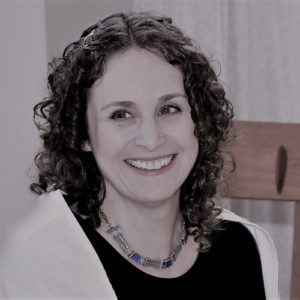The Oral History Center is pleased to announce our newest staff member, Jill Schlessigner. She joins our team as Communications Manager. We caught up with her recently to chat about her background in history, interest in oral history, and the projects that she’s most excited to embark on with the OHC.

Q: When did you first encounter oral history?
Schlessinger: As an undergraduate at UC Berkeley, I chose a senior thesis research course that was about oral history. I studied the field of oral history interviewing and research methodology and wrote an oral history thesis. I studied female college students’ attitudes towards abortion from the 1950s to 1980s. Interviewing people from different backgrounds and perspectives taught me a lot about the importance of solid preparation, not making assumptions, and keeping an open mind.
Q: You recently joined our team as a Communications Manager. What were you doing before the OHC?
Schlessinger: Before joining the Oral History Center, I was a content strategist in Student Affairs Communications at UC Berkeley. I’ve had the opportunity to work in a number of fields in my career — higher education, health care, human resources, technology — and I find working in education to be especially fulfilling.
Q: You have a PhD from UCB in History. What did you study?
Schlessinger: I studied US History at the turn of the century, with a focus on social history and women’s history. My dissertation, “Such Inhuman Treatment”: Family Violence in the Chicago Middle Class, 1871–1920, was an analysis of changing power dynamics and community intervention in middle-class families. Something interesting I learned was that many Chicago residents, without anywhere else to turn, pressured the local Society for the Prevention of Cruelty to Animals to address cases of child cruelty, and the Society ultimately changed its mission and name. The Illinois Humane Society became a pioneering child-saving organization. This is something that happened in cities across the country, and numerous animal protection agencies also expanded to protect children and other vulnerable people from physical cruelty.
Q: Which of the OHC interviews do you feel the most connection to, either because of your PhD or current interests?
Schlessinger: It’s challenging to choose just one project because the Oral History Center’s interviews touch on so many of our society’s most pressing issues. However, I would say I feel a connection to the interviews from the Rosie the Riveter World War II American Home Front collection. The Rosies are an important part of women’s history, the history of World War II, and our local history here in the East Bay, and I’ve always found their stories inspiring. On a fun note, I helped break the Guinness world record for the most people dressed as Rosie the Riveter in one place! It’s wonderful that the Oral History Center is instrumental in preserving these voices.
Q: What projects are most excited to be working on?
Schlessinger: The team at the Oral History Center produces an enormous amount of important work. There are the oral history interviews, of course, which delve into the thinking of some of California’s — and the world’s — greatest pioneers and influencers. And the podcasts based on these interviews bring to life the experiences of our narrators and the causes they championed. The Center also conducts a number of educational programs, which reach beyond academics to support journalists, public historians, independent scholars, and others to deepen their interviewing and research skills. We also employ a small army of students who help us with video and transcript production, research, communications, and more. Without them, our historians wouldn’t be able to conduct so many interviews, and it’s wonderful that in turn we are also able to give our students meaningful research and work opportunities. I’m excited to develop a communications plan that helps the Oral History Center share all of this marvelous work, so that people are able to take advantage of everything we have to offer.
Q: How do we get in touch with you?
Schlessinger: You can reach me at jill.schlessinger@berkeley.edu. I’d love to hear from anyone who is interested in helping us share the stories of our narrators and the Center.